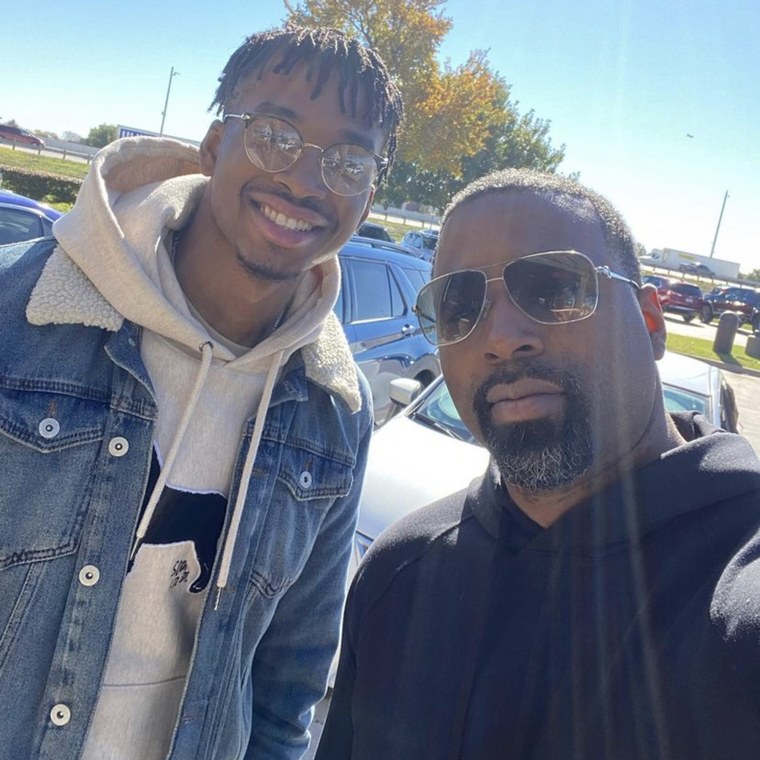Michael Phillips is the author of the new book, “Wrong Lanes Have Right Turns: A Pardoned Man’s Escape from the School-to-Prison Pipeline and What We Can Do to Dismantle It.” He appeared on TODAY to share his story and wrote this essay about his journey with his son.
If you ever had the experience of seeing your child come into the world, you know it’s a moment you will never forget. I remember standing in the delivery room wearing remnants of my past life — a Tommy Hilfiger shirt, a pair of Polo jeans with the Polo Ranger buckle boots to match — all covered by the awkward hospital gown.
Seeing my wife persevere through labor, I was blown away by the overwhelmingly joyful encounter of seeing new life. I held my son for the first time and without hesitation, I said to myself, “I’ve got to get my stuff together.” That night I slept in the uncomfortable chair in the maternity room next to his bassinet, and my discomfort became inconsequential. It was no longer about me. I knew that I would do whatever it took for him to have a different life, but that would require me to have a different life as well.
More than 2 million people are incarcerated in the U.S. I was once one of those people.
When I was 12, my father, a pastor, died of a stroke. I was already on the fringe of having to navigate some of the criminal elements of my community, but when my father died, it pushed me further away from the church. The guys on the corner became my pastors. I started selling drugs. At the age of 18, I was arrested. I was awaiting trial and facing a 30-year sentence when the judge gave me a choice as part of a special program: go to prison or go to college and get an education. I said, “I would love to go to school,” and it changed my life forever.

Still, I found myself as an adult carrying the expectations of a life sentence freed from me; I was stuck in survival mode. I had no reference of what to do with the nonsensical, unjust, traumatic events of my life. I didn’t know how to flourish. But the moment my son was born, I had to figure out what to do with my pain. The pain that we are not willing to transform we will transmit. My wounds would not become his inheritance. So I made a decision. A choice to have a different attitude about what happened to me and the world I experienced. It was a decision that did not change my situation, but it changed my perspective. That choice helped my son and me step into a culture of possibility.
It's very easy to become what you always see.
michael phillips
When you don’t see what you can become, when you don’t see success in your color often, it’s very easy to become what you always see. And what I always saw were men who looked like me who had to do nefarious things to make it.
From an early age, I was convinced that I was born to lose. It was usual for me to hear the deficit language often used to characterize young Black males. The language of other people’s fear and anger situated me in a very unsafe and dangerous universe. I didn’t come from a broken home; in fact, my home life was beautiful. But I grew up with a set of expectations and labels dumped on me before I could ever fully develop. Expectations and labels that I didn’t want my son to have.
He didn’t have to contend with the soft bigotry of low expectations.
Michael phillips
My son graduated from Harvard in 2020. He got there because he grew up in an environment with a healthy ecosystem that told him it was possible. He didn’t know anything else. He didn’t have to contend with the soft bigotry of low expectations. Harvard was never the goal, but it was the outcome of him having access to a high-quality education, a loving environment coupled with a lot of hard work that he put in.
Today, we stand at a similar moment, much like I did when my son was born, witnessing opportunity for change. As traumatic as the last few years have been, they have brought us to a seismic cultural shift, a reset in how we treat one another. A time where we have to decide whether or not we will continue to punish ourselves and one another for the things we fear, the things we are angry about, the trauma we have endured or the blame we need to have validated. We can either be generational thieves or create the generational equity all of our children deserve.
A culture of punishment cannot see the necessity of thinking generationally through a lens of equity and empathy or hearing about the lives it counts as worthless. A culture of possibility doesn’t count anyone out but finds a way through the inconvenience to do whatever it takes to help the next generation have a better life.